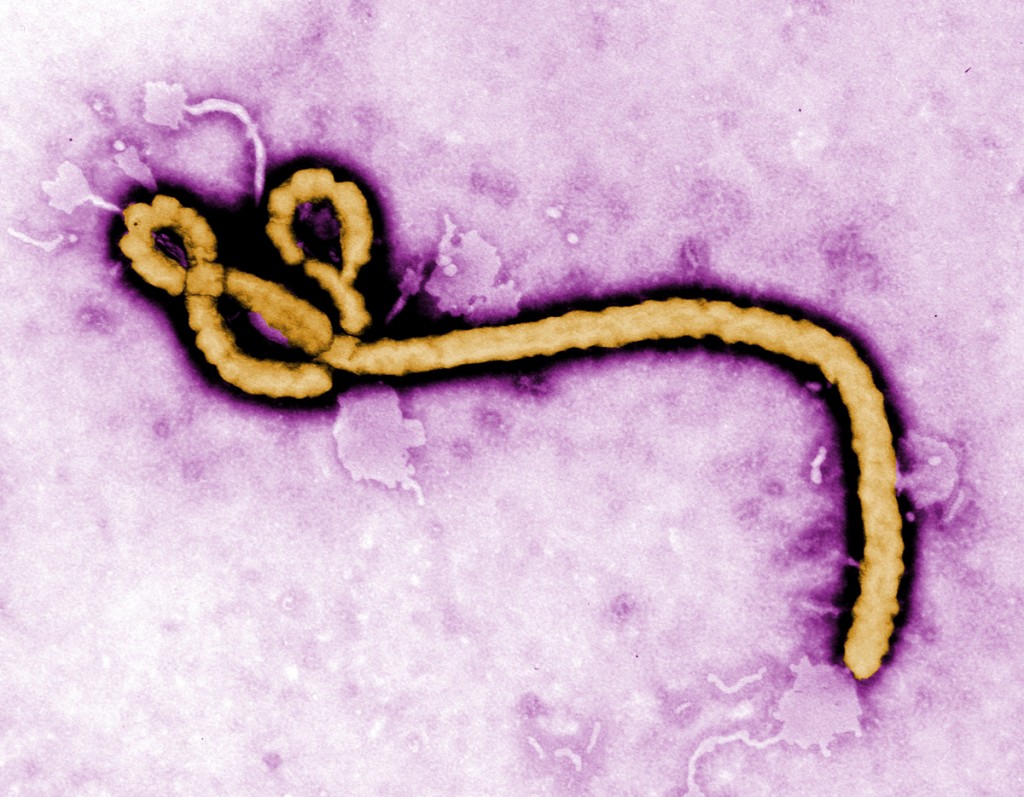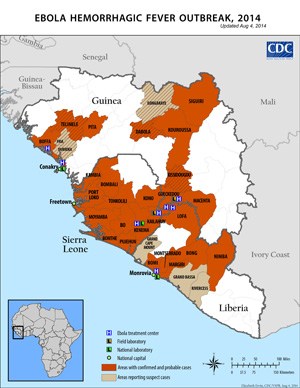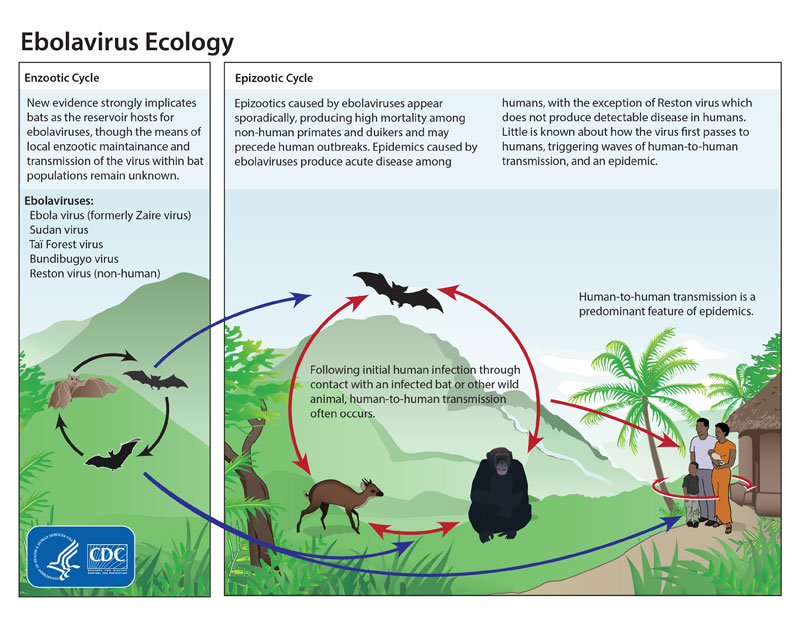
Update as of 7/31/14, 2:25 p.m. EDT: The CDC has issued a Level 3 Warning and urges all US residents to avoid nonessential travel to Sierra Leone, Guinea, and Liberia due to the Ebola outbreak.
You may have noticed Ebola, a severe acute viral illness that is native to several African countries, creeping up in the news. Latest findings from the WHO report that the disease has caused 672 deaths in Guinea, Liberia and Sierra Leone. Some new concerns around Ebola have also surfaced as three Americans — a doctor, an aid worker and government official in the Liberian Ministry of France — were infected with the virus. The government official was isolated at a local Nigerian hospital and died five days later. And while these are facts you should take seriously, it’s important not to panic — the CDC believes that Ebola poses little risk to the U.S. general population. However, they do urge US travelers to avoid non-essential travel to Sierra Leone, Guinea, and Liberia. That said, if you must travel to West Africa, you should practice some enhanced precautions. Here are some facts on Ebola, including some advice for preventing it.
In which countries have Ebola outbreaks been reported?
 Ebola is causing the first outbreak ever known to occur in West Africa in the countries of Guinea, Liberia and Sierra Leone. This is also the first sizable outbreak anywhere on the continent for the last seven years.
Ebola is causing the first outbreak ever known to occur in West Africa in the countries of Guinea, Liberia and Sierra Leone. This is also the first sizable outbreak anywhere on the continent for the last seven years.
What are the symptoms of Ebola?
Initial symptoms of Ebola typically include: sudden onset of fever, weakness, joint and muscle pain, headache and sore throat. These are often followed by diarrhea, vomiting, impaired kidney/liver function, rash and sometimes even internal and external bleeding. Symptoms may appear anywhere from 2 to 21 days after exposure, though 8-10 days is most common. If you have been in an area with Ebola or in contact with a person known (or suspected) to have the virus and you begin to experience any of these symptoms, seek medical care immediately.
Is Ebola fatal?
According to the WHO, Ebola is often fatal with a death rate of up to 90%.
Who is at risk of contracting Ebola?
Those at highest risk for Ebola are health care workers in the West Africa region and the family and friends of an infected individual. Though the risk to most travelers is low, one can be infected if they come into contact with an ill person’s blood or body fluids, sick wildlife or infected bushmeat of animals like bats, squirrels, monkeys, and antelope.

How is Ebola caused and is it contagious?
Once a person comes into contact with an animal that has Ebola, it can be spread from person to person — usually through direct contact with the blood or secretions of an infected person and/or exposure to objects (like needles) that have been contaminated with infected secretions. To help control the virus from spreading, people that are suspected or confirmed to have Ebola will be tested to confirm infection and treated by healthcare professionals. They will not be allowed to leave the country, destination countries will quarantine them and may not allow them to enter.
What is being done to contain the Ebola virus?
Earlier this week, news sources reported that authorities across West Africa are taking a series of measures to help prevent the Ebola virus from spreading. Liberia closed most of its border  crossings, restricted public gatherings and heavily quarantined communities heavily affected by the outbreak. Nigeria (one of Africa’s most densely populated countries) shut down and quarantined the hospital in the city of Lagos where a man died from Ebola. Following suit, Sierra Leone deployed its army this morning to quarantine affected neighborhoods and ban public meetings for at least 60 days (unless they are related to education about the virus).*
crossings, restricted public gatherings and heavily quarantined communities heavily affected by the outbreak. Nigeria (one of Africa’s most densely populated countries) shut down and quarantined the hospital in the city of Lagos where a man died from Ebola. Following suit, Sierra Leone deployed its army this morning to quarantine affected neighborhoods and ban public meetings for at least 60 days (unless they are related to education about the virus).*
Note: Some major and regional airlines have suspended flights — if you’re traveling to the area, check with your airline carrier as well as the CDC’s and State Department’s websites for the latest notices, warnings and alerts.
(*Ebola is an evolving news story; be sure to check with trusted sources such as your travel assistance provider, the CDC, State Department and WHO for the most up-to-date information on the Ebola virus.)
Are there treatments and vaccines for Ebola?
Timely treatment of Ebola is important, but also challenging since the early symptoms of the disease (headache, fever etc.) are nonspecific to the virus. Standard treatment for Ebola is still limited to supportive therapy — balancing fluids and electrolytes, maintaining oxygen status and blood pressure and treatment for any complicating infections. Currently, several vaccines for Ebola are being tested, but none are available for clinical use.
How can travelers protect themselves from Ebola?
Understanding Ebola, its risk factors and the precautionary measures you can take is the best way to prevent it. Travelers should follow these guidelines: 
- Avoid non-essential travel to Liberia, Guinea and Sierra Leone.
- In the event you need medical care, avoid hospitals where Ebola patients are being treated.
- Avoid contact with blood and body fluids and don’t handle items that may have come in contact with an infected person’s blood or body fluids.
- Avoid funeral or burial rituals that require handling the body of someone who has died from Ebola.
- Practice careful hygiene-for example; wash your hands often with warm water and soap– if soap and water are not available, use alcohol-based hand sanitizer containing at least 60 percent alcohol.
- Avoid contact with animals and raw meat.
- Seek medical care if you develop headache, fever, sore throat, achiness, diarrhea, vomiting, rash, red eyes, or stomach pain during or after your trip. Limit your contact with others when traveling to the doctor and do not travel anywhere else.
- After you return, monitor your health for 10 days if you were in an area with an Ebola outbreak and for 21 days if you think you might have been exposed to Ebola. If you need to seek medical care, make sure your doctor knows about your recent travels and your symptoms before you go to the office or emergency room.
And remember — On Call members can always check with us on for the most up-to-date health and safety information for their destinations.
Safe Travels!
Ebola virus, map and graphics from the Centers for Disease Control
Washing hands from peapod labs


